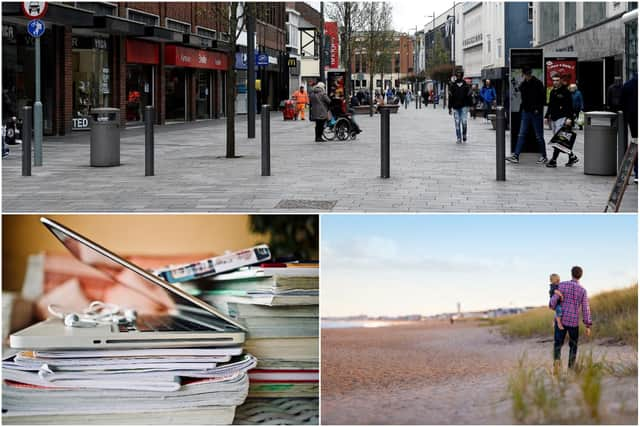Sunderland's health chief answers your questions on schools, shops and shared parent time
and live on Freeview channel 276
These are the latest questions to be answered by Wearside’s public health boss.
We’ve teamed up with Sunderland’s Director of Public Health, Gillian Gibson, to bring you a regular column answering some of your questions on the current coronavirus situation.
Advertisement
Hide AdAdvertisement
Hide AdShe has already answered questions about using facemasks and why Sunderland has higher rates of COVID-19 infections than other areas.


We’ve put those questions to Gillian and she’s answered them below.
Remember, if you have something you would like to ask or would like advice or guidance on any issues that impact on people’s health in Sunderland, please contact us on our Facebook page and we will send a selection to Gillian each week.
Darrel Rush has asked: “Can I have my young son stay at my home as he lives with his mother and wants to stay sometimes with me?
Advertisement
Hide AdAdvertisement
Hide AdGillian said: “The Government’s guidance on “Staying alert and safe” – also known as social distancing – is clear that where parents or others with parental responsibility do not live in the same household, children aged under 18 can be moved between their parents’ homes to continue existing arrangements for access and contact.


“So if you would normally have had contact with your son, it is fine for him to come and stay with you sometimes.
“And remember that you can reduce the risk of passing on the virus by regularly washing your and your son’s hands, catching coughs or sneezes with a tissue, then throwing the tissue in the bin and regularly cleaning and disinfecting frequently touched objects and surfaces in your home.”
Alan Patterson’s question is: “Why are so many shops allowed to have opened up again?
Advertisement
Hide AdAdvertisement
Hide AdGillian said: “In March, when the measures to protect us from COVID-19 were introduced, businesses and venues were divided into three groups.
“The first group was businesses and venues that were deemed to be essential and must therefore remain open, e.g food retailers including supermarkets, community pharmacies.
“The second group was businesses and venues that were required by law to close to members of the public e.g restaurants and bars, hairdressers.
“The third group was all other businesses and venues, which were allowed to open if they could do so safely whilst adhering to social distancing guidance.
Advertisement
Hide AdAdvertisement
Hide Ad“While initially many of these businesses in this third group chose to close their doors, increasingly they have put in place measures to help them operate safely and are opening their doors again.
“They are allowed to do this.
“From Wednesday, May 13, some of the businesses in the second group were allowed to open again, for example garden centres.
“This week the Government has published its COVID-19 Recovery Strategy which sets out a phased approach which seeks to balance the impact on the economy with the need to protect people’s health.
“At present the advice is for people to continue to work from home where they are able to.
Advertisement
Hide AdAdvertisement
Hide Ad“Where they cannot work from home, people should be enabled to go back to work by following ‘COVID-19 secure’ guidelines.
“These build on existing health and safety requirements and require all workplaces to identify, assess and manage the risks of COVID-19 by putting in place a range of measures.
“These include: social distancing; cleaning and hygiene; PPE; managing staff; managing customers, visitors and contractors; and managing goods.”
Catherine Heslop Sweeney asked “I'm particularly worried about schools restarting.
Advertisement
Hide AdAdvertisement
Hide Ad“I know the Government keep saying that children are less like poorly with COVID-19 and are more likely to spread the illness.
“What about children with health problems or have parents that are in the shielded category?
Gillian said: “The earliest that children will be returning to school is Monday, June 1, but this will only happen if we are meeting the five clear tests that the Government and Public Health England has set out for making adjustments and changes to the lockdown.
“This is likely to be challenging and guidance is now being published to support nurseries, schools and college to prepare.
Advertisement
Hide AdAdvertisement
Hide Ad“Initially, early years and primary schools will be asked to support children in nursery, reception, Year 1 and Year 6 to return to school.
“Secondary schools, sixth forms and colleges will be asked to ensure that young people in Year 10 and Year 12, who have key exams during the next academic year, are provided with some face to face support alongside remote education.
“This is likely to be a gradual process of return so that schools can work with a reduced number of children and young people in classrooms, whilst protective measures are embedded.
“These include: Ensuring children and young people do not attend school if they or a member of their family have COVID-19 symptoms;
Advertisement
Hide AdAdvertisement
Hide Ad“Washing hands more often, ideally using soap and running water for at least 20 seconds, and drying them thoroughly;
“Observing good respiratory hygiene by sneezing or coughing into a tissue, throwing it away and then washing hands – ‘Catch It, Bin It, Kill It’ – regularly cleaning frequently touched surfaces and minimising social contact by adjusting classroom layouts and changing timetables to stagger breaks and reducing class sizes.
“It is true that for the vast majority of children and young people, COVID-19 is a mild illness.
“However, children who have been identified as being extremely clinically vulnerable – e.g, children who have had an organ transplant, are receiving cancer some treatments, have a long-term lung disease, have a rare or inherited metabolic disorder or are taking medication that compromises their immune system - are at very high risk of severe illness requiring admission to hospital as a result of coronavirus.
Advertisement
Hide AdAdvertisement
Hide Ad“These children have been advised to ‘shield’ and are not expected to return to school or college at this stage; they will continue to be supported at home.
“If a child or young person lives in a household with someone else who is extremely clinically vulnerable and has been advised to shield, they should only return to school if they are able to understand and follow instructions about stringent social distancing.
“If this is not possible, then the child or young person will not be able to return to school and will be supported to learn from home.
“For children who have other conditions that put them at a higher risk of severe illness from COVID-19, but who are not extremely clinically vulnerable, parents should seek and follow medical advice to determine whether their child should return to school or not.
Advertisement
Hide AdAdvertisement
Hide Ad“If a child or young person lives with someone who is clinically vulnerable, but not clinically extremely vulnerable e.g. because they have a long-term condition, are severely overweight or are pregnant - they can return to school.”